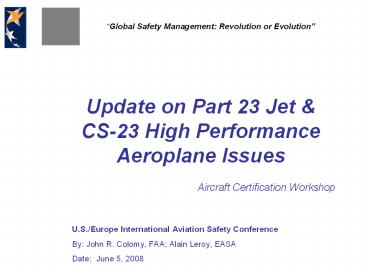Update on Part 23 Jet - PowerPoint PPT Presentation
1 / 18
Title:
Update on Part 23 Jet
Description:
EASA generic CRIs are not limited to jets. ... Based on experience of certificating small jets since 1958. Core requirements for jets goes back 30 years. ... – PowerPoint PPT presentation
Number of Views:137
Avg rating:3.0/5.0
Title: Update on Part 23 Jet
1
Update on Part 23 Jet CS-23 High Performance
Aeroplane Issues
- Aircraft Certification Workshop
2
Issues
- Scope Differences
- Generic VIs Standard Differences
- Current Projects
- Suspended Projects
3
Scope Differences
- FAA has found that Title 14 Code of Federal
Regulations (14 CFR) part 23 does not contain
adequate or appropriate safety standards for jet
airplanes. - EASA has found that Certification Specification
CS-23 does not contain adequate or appropriate
safety standards for high performance aeroplanes
4
Scope Differences
- FAA is applying part 23 jet policy.
- Single-engine Normal, Utility and Acrobatic
Category - 12500 lbs or less
- 9 passengers or less
- Multi-engine Normal, Utility and Acrobatic
Category - 6000 lbs or less
- 9 passengers or less
- Multi-engine Normal, Utility and Acrobatic
Category - 12500 lbs or less but greater than 6000 lbs
- 9 passengers or less
- Multi-engine Commuter Category
- 19000 lbs or less
- 19 passengers of less
5
Scope Differences
- EASA is developing a Basic Set of CRIs, also
including (generic) CRIs applying to CS-23 high
performance airplanes (HPA) - MD Mach 0.6
- Service ceiling 25,000 ft
- EASA generic CRIs are not limited to jets.
- Out of the Basic Set of CRIs CRIs will only be
applied as required depending on specific design
of the airplane.
6
Generic VIs Standards Differences
- FAA Generic VIs Standard Differences
- 12 generic VIs corresponding to 11 significant
standard differences and one different acceptable
means of compliance. - 3 Non-significant standard differences.
- Developed and first published on FAA website in
April 2005 time frame.
7
Generic VIs Standards Differences
- FAA has developed an unofficial part 23 jet guide
to help ACOs in type certification - Based on experience of certificating small jets
since 1958. - Core requirements for jets goes back 30 years.
- We are now at 39 pages of special conditions for
Normal category multi-engine jets - 12500 lbs or less but greater than 6000 lbs
- 9 passengers or less
8
Generic VIs Standards Differences
- EASA is in the process of developing these lists.
- Basic Set of CRIs, Current status
- 19 Generic CRIs calling up Special Conditions are
released - 7 CRIs calling up AMC / GM for HPA are released
- 14 Generic CRIs calling up Special Conditions are
under discussion (of which 11 are the split up of
the typical single CRI for Flight Items) - 2 CRIs calling up AMC / GM for HPA are under
discussion. - 27 Standard CRIs applied based on new technology
to all CS-23 airplanes (HIRF, Software, etc.) - Note Only a limited number of CRIs will be
applied as required depending on specific design
of airplane
9
Part 23 Jet Project Status
- The FAA has 11 open certification projects for
light jets - 9 currently active
- 2 suspended
- The designs range from an under 6,000-pound,
single-engine jet to twin-engine, commuter
category jets. - Other manufacturers are developing jet designs
and depending on viability, there may be as many
as eighteen additional light jet type
certification projects. - Many of the US based firms are, or will be,
seeking EASA validation.
10
Part 23 Jet Project Status
- Six US based firms have applied for EASA
validation. - The current or anticipated FAA/EASA validation
projects are - Cessna Aircraft CompanyCitation CitationJet
CJ4. - Eclipse AircraftModel 500.
- HondaHondaJet.
- Projects that have suspended EASA validation
efforts - Aviation Technology GroupModel 100 (Javelin).
- Adam AircraftModel 700.
- Spectrum AeronauticalModel 33 and Model 40.
11
CS-23 HPA Project Status
- EASA has one commuter category jet from an which
is seeking FAA validation. - Grob AerospaceG180A, (Germany).
12
Part 23 Jet Current Projects
- Cessna Aircraft Company
- Citation CJ4
- Wichita, KS
- www.cessna.com
- Diamond Aircraft Industries Inc.
- D-Jet
- London, Ontario, Canada
- www.diamond-air.at
13
Part 23 Jet Current Projects
- Embraer
- EMB-500 (Phenom 100)
- São José dos Campos, Brazil
- www.embraer.com
- Embraer
- EMB-505 (Phenom 300)
- São José dos Campos, Brazil
- www.embraer.com
14
Part 23 Jet Current Projects
- Grob Aerospace
- G180 SPn Utility Jet
- Tussenhausen-Mattsies, Germany
- www.grob-spn.com
- Honda
- HondaJet
- Greenville, NC
- world.honda.com/HondaJet/
15
Part 23 Jet Current Projects
- The New Piper Aircraft Co., Inc.
- PA-46-J1
- Vero Beach, FL
- www.newpiper.com/piperjet/
- Spectrum Aeronautical LLC
- S-33 Independence
- Cardiff by the Sea, CA and Spanish Forks, UT
- www.spectrum.aero
16
Part 23 Jet Current Projects
- Spectrum Aeronautical LLC
- S-40 Freedom
- Cardiff by the Sea, CA and Spanish Forks, UT
- www.spectrum.aero
17
Part 23 Jet Suspended Projects
- Aviation Technology Group (ATG)
- Model 100 Mk10 and Model 100 Mk20 "Javelin"
- Englewood, CO
- www.avtechgroup.com
- Adam Aircraft Industries (AAI)
- A700
- Englewood, CO
- www.adamaircraft.com
18
Summary
- Scope Differences
- Generic VIs Standard Differences
- Current Projects
- Suspended Projects






























![[Latest Update] CompTIA CS0-003 Actual Exam Practice Questions Shared Online PowerPoint PPT Presentation](https://s3.amazonaws.com/images.powershow.com/10140963.th0.jpg?_=20240927016)
